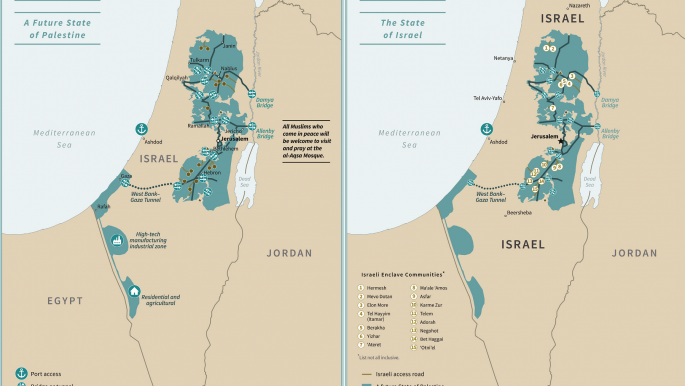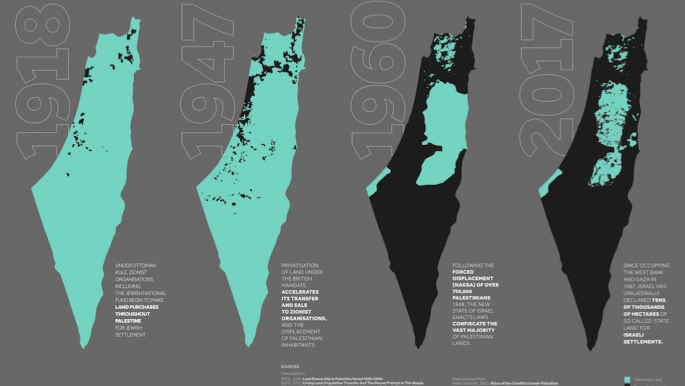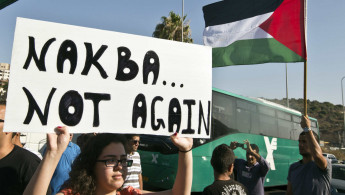Trump's 'apartheid' plan could spell land transfer for Palestinian-Israelis, MK warns
Most Palestinian citizens of Israel have spoken out against land transfers.
4 min read
'There will not be another Nakba', said the mayor of Tayibe [Getty]
President Donald Trump's so-called "Deal of the Century" peace plan could herald population and land transfers between Israel and the West Bank, a Palestinian-Israeli politician has warned.
Revealed after a three-year wait on Tuesday by Trump and his Israeli counterpart Benjamin Netanyahu, the plan will create an "apartheid state between the river and the sea", Said al-Harumi told Arabi21.
The Palestinian-Israeli member of the Knesset has pointed to a little-examined point in the 80-page plan which indicates both Israel and its key sponsor the US are open to a possible land transfer which would see Palestinian citizens of Israel become citizens of a future Palestinian state.
As shown in a "conceptual map" released by the White House on Tuesday, a Palestinian state carved out under the deal would consist of a dissected West Bank, the Gaza Strip and two largely uninhabited tracts of the Negev desert. It gives Israel the greenlight to annex both Israeli settlements and the Jordan Valley, which makes up around a third of the occupied West Bank.
But the plan also provides for possible land and population transfers between Israel and the future Palestinian state.
Such a transfer is explicitly discussed in the plan referring to an area of northern Israel known as the "Triangle".
Read more: Trump's 'peace plan' is nothing but repackaged Israeli apartheid
Bordering the northern West Bank, the Triangle is home to a majority of Palestinian citizens of Israel.
"Land swaps provided by the State of Israel could include both populated and unpopulated areas," the plan notes.
The 80-page document then goes on to address the Triangle communities, explicitly referring to the towns of Kafr Qara, Ar'ara, Baha al-Gharbiyye, Umm al-Fahm, Qalansawe, Tayibe, Kafr Qasim, Tira, Kafr Bara and Jaljulia.
"These communities, which largely self-identify as Palestinian, were originally designated to fall under Jordanian control during the negotiations of the Armistice Line of 1949, but ultimately were retained by Israel for military reasons that have since been mitigated," the document reads.
"The Vision contemplates the possibility, subject to agreement of the parties that the borders of Israel will be redrawn such that the Triangle Communities become part of the State of Palestine," it explains, adding that if such a transfer were to take place, residents of the area would forfeit their rights as Israeli citizens.
Around 400,000 Palestinian-Israelis live in the Triangle, Hurumi said.
The Joint List MK went on to describe the so-called "Deal of the Century" as being prepared by Israel's Netanyahu, rather by Trump and Jared Kushner, his son-in-law and advisor.
"This plan was written in Tel Aviv and announced in the White House," he said.
"Many proposals have been put in this plan that no Palestinian could agree to," Hurumi added.
Both Palestinian officials and protesters have rejected the deal. The annexation of large swathes of the West Bank and the allowance of an "undivided Israeli capital" in Jerusalem are key deal-breakers.
What do Palestinian-Israelis think?
It is not the first time such an offer has been put on the table. In 2004, far-right Israeli politician Avigdor Lieberman proposed exchanging the Triangle region for Israeli settlements in the West Bank.
While many Israeli proponents of a two-state solution favour such a plan - which allows Israel to retain a much-treasured Jewish majority - Palestinian citizens of Israel have historically rejected such proposals as racist.
A 2000 survey of residents of the Triangle's most populous town, Umm al-Fahm, found 83 percent would prefer remaining under Israeli jurisdiction.
Palestinian citizens of Israel have vowed to fight the possibility of a land transfer in the wake of Trump and Netanyahu's announcement on Tuesday.
Knesset member Youssef Jabareen condemned the Israeli government as "out of control".
"Umm al-Fahm is my hometown. Wadi Ara is the landscape of my life. Hundreds of thousands of Arab citizens live in the Triangle and this is their homeland," he said. "Trump and Netanyahu's annexation plan includes a section that lays the groundwork for transfer and the revocation of their citizenship."
Palestinian-Israelis have branded the proposal a possible population transfer, which would be a crime under the Geneva conventions. If agreed by two both parties, territorial exchange would not be illegal under international law.
Trump's plan states that such a transfer should be agreed by both Palestine and Israel, but it is unclear whether Palestinian citizens of Israel would be consulted. The plan also states that "no Palestinians or Israelis will be uprooted from their homes".
The multilateral nature of the proposal has not been afford to Israel's proposed sovereignity over the Jordan Valley and settlements in the West Bank.
Follow us on Twitter and Instagram to stay connected
Revealed after a three-year wait on Tuesday by Trump and his Israeli counterpart Benjamin Netanyahu, the plan will create an "apartheid state between the river and the sea", Said al-Harumi told Arabi21.
The Palestinian-Israeli member of the Knesset has pointed to a little-examined point in the 80-page plan which indicates both Israel and its key sponsor the US are open to a possible land transfer which would see Palestinian citizens of Israel become citizens of a future Palestinian state.
As shown in a "conceptual map" released by the White House on Tuesday, a Palestinian state carved out under the deal would consist of a dissected West Bank, the Gaza Strip and two largely uninhabited tracts of the Negev desert. It gives Israel the greenlight to annex both Israeli settlements and the Jordan Valley, which makes up around a third of the occupied West Bank.
But the plan also provides for possible land and population transfers between Israel and the future Palestinian state.
Such a transfer is explicitly discussed in the plan referring to an area of northern Israel known as the "Triangle".
Read more: Trump's 'peace plan' is nothing but repackaged Israeli apartheid
Bordering the northern West Bank, the Triangle is home to a majority of Palestinian citizens of Israel.
 |
| [Click to enlarge] |
The 80-page document then goes on to address the Triangle communities, explicitly referring to the towns of Kafr Qara, Ar'ara, Baha al-Gharbiyye, Umm al-Fahm, Qalansawe, Tayibe, Kafr Qasim, Tira, Kafr Bara and Jaljulia.
"These communities, which largely self-identify as Palestinian, were originally designated to fall under Jordanian control during the negotiations of the Armistice Line of 1949, but ultimately were retained by Israel for military reasons that have since been mitigated," the document reads.
"The Vision contemplates the possibility, subject to agreement of the parties that the borders of Israel will be redrawn such that the Triangle Communities become part of the State of Palestine," it explains, adding that if such a transfer were to take place, residents of the area would forfeit their rights as Israeli citizens.
Around 400,000 Palestinian-Israelis live in the Triangle, Hurumi said.
The Joint List MK went on to describe the so-called "Deal of the Century" as being prepared by Israel's Netanyahu, rather by Trump and Jared Kushner, his son-in-law and advisor.
"This plan was written in Tel Aviv and announced in the White House," he said.
"Many proposals have been put in this plan that no Palestinian could agree to," Hurumi added.
Both Palestinian officials and protesters have rejected the deal. The annexation of large swathes of the West Bank and the allowance of an "undivided Israeli capital" in Jerusalem are key deal-breakers.
What do Palestinian-Israelis think?
It is not the first time such an offer has been put on the table. In 2004, far-right Israeli politician Avigdor Lieberman proposed exchanging the Triangle region for Israeli settlements in the West Bank.
While many Israeli proponents of a two-state solution favour such a plan - which allows Israel to retain a much-treasured Jewish majority - Palestinian citizens of Israel have historically rejected such proposals as racist.
A 2000 survey of residents of the Triangle's most populous town, Umm al-Fahm, found 83 percent would prefer remaining under Israeli jurisdiction.
 |
| [Click to enlarge] |
Palestinian citizens of Israel have vowed to fight the possibility of a land transfer in the wake of Trump and Netanyahu's announcement on Tuesday.
"This is a nightmare that cannot be implemented," Tayibe Mayor Shuaa Massarweh Mansour said, according to Israeli website ynet.
"The plan is delusional, but we say in the clearest way possible - there will not be another Nakba," he said, referring to the 1948 forced displacement of hundreds of thousands of Palestinians.
"Peace is made with the enemy. We are residents of the state, and we are not the enemy. The prime minister wants to save his skin at the expense of inciting hatred against the Arab population," Mansour added.
Read more: Surrender to Israel or disappear: Trump's 'Deal of the Century' is an ultimatum to Palestinians
Read more: Surrender to Israel or disappear: Trump's 'Deal of the Century' is an ultimatum to Palestinians
Knesset member Youssef Jabareen condemned the Israeli government as "out of control".
"Umm al-Fahm is my hometown. Wadi Ara is the landscape of my life. Hundreds of thousands of Arab citizens live in the Triangle and this is their homeland," he said. "Trump and Netanyahu's annexation plan includes a section that lays the groundwork for transfer and the revocation of their citizenship."
Palestinian-Israelis have branded the proposal a possible population transfer, which would be a crime under the Geneva conventions. If agreed by two both parties, territorial exchange would not be illegal under international law.
Trump's plan states that such a transfer should be agreed by both Palestine and Israel, but it is unclear whether Palestinian citizens of Israel would be consulted. The plan also states that "no Palestinians or Israelis will be uprooted from their homes".
The multilateral nature of the proposal has not been afford to Israel's proposed sovereignity over the Jordan Valley and settlements in the West Bank.
Follow us on Twitter and Instagram to stay connected





 Follow the Middle East's top stories in English at The New Arab on Google News
Follow the Middle East's top stories in English at The New Arab on Google News
![Israeli forces ordered bombed Gaza's Jabalia, ordering residents to leave [Getty]](/sites/default/files/styles/image_330x185/public/2176418030.jpeg?h=a5f2f23a&itok=_YGZaP1z)

